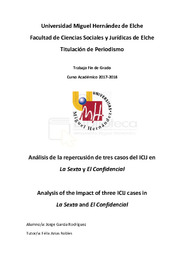Por favor, use este identificador para citar o enlazar este ítem:
https://hdl.handle.net/11000/7183Registro completo de metadatos
| Campo DC | Valor | Lengua/Idioma |
|---|---|---|
| dc.contributor.advisor | Arias Robles, Félix | - |
| dc.contributor.author | García Rodríguez, Jorge | - |
| dc.contributor.other | Departamentos de la UMH::Ciencias Sociales y Humanas | es |
| dc.date.accessioned | 2021-02-25T12:02:36Z | - |
| dc.date.available | 2021-02-25T12:02:36Z | - |
| dc.date.created | 2017-09 | - |
| dc.date.issued | 2021-02-25 | - |
| dc.identifier.uri | http://hdl.handle.net/11000/7183 | - |
| dc.description.abstract | En la última década, el periodismo colaborativo de investigación ha crecido como rama de la información, reportando grandes historias a través de organizaciones de periodistas que, sin ánimo de lucro, dedican su tiempo a investigar filtraciones anónimas y a destapar grandes tramas económicas y políticas. De entre ellas, cabe destacar al Consorcio Internacional de Periodistas de Investigación (ICIJ, por sus siglas en inglés), cuyas investigaciones sobre la existencia de sociedades pantalla en paraísos fiscales le han otorgado un papel clave dentro del periodismo de investigación colaborativo. Pero, ¿cómo han repercutido estos casos en el público y los medios españoles? ¿Qué caso del ICIJ habrá creado mayor impacto en España? Para responder a estas preguntas, este estudio analizará la repercusión de tres casos del ICIJ (Offshore Leaks, Swiss Leaks y Panama Papers) en dos medios españoles (La Sexta y El Confidencial) empleando datos de audiencia, tráfico web, y redes sociales (Facebook y Twitter), y obteniendo resultados tales como la prevalencia de Panama Papers como caso más relevante en España, y el escaso impacto de Offshore Leaks. | es |
| dc.description.abstract | Over the last decade, collaborative investigative journalism has grown as a branch of delivering information, reporting great stories through journalistic organizations. These non-profit organizations devote their time to researching anonymous leaks and uncovering huge economic and political plots. Among them, it is worth mentioning the International Consortium of Investigative Journalism (ICIJ). Their investigations into the existence of shell companies in tax havens have given them a key role in collaborative investigative journalism. However, how did these cases impact the Spanish public and media? Which ICIJ case has created the greatest impact on Spain? To answer these questions, this research will analyze the impact of three ICIJ cases (Offshore Leaks, Swiss Leaks, and Panama Papers) in two Spanish media outlets (La Sexta and El Confidencial) using audience response, web traffic, and social network data (Facebook and Twitter), obtaining results such as the prevalence of Panama Papers as the most relevant case in Spain, followed by Swiss Leaks, and the low impact of Offshore Leaks. | es |
| dc.format | application/pdf | es |
| dc.format.extent | 65 | es |
| dc.language.iso | spa | es |
| dc.rights | info:eu-repo/semantics/openAccess | es |
| dc.subject | Periodismo colaborativo investigación | es |
| dc.subject | Collaborative investigative journalism | es |
| dc.subject | ICIJ | es |
| dc.subject | repercusión | es |
| dc.subject | redes sociales | es |
| dc.subject | España | es |
| dc.subject | impact | es |
| dc.subject | social media | es |
| dc.subject | Spain | es |
| dc.subject.other | CDU::0 - Generalidades.::070 - Periódicos. Prensa. Periodismo. Ciencias de la información | es |
| dc.title | Análisis de la repercusión de tres casos del ICIJ en La Sexta y El Confidencial | es |
| dc.title.alternative | Analysis of the impact of three ICIJ cases in La Sexta and El Confidencial | es |
| dc.type | info:eu-repo/semantics/bachelorThesis | es |

Ver/Abrir:
PER_TFG_GARCÍA_RODRÍGUEZ_JORGE.pdf
2,33 MB
Adobe PDF
Compartir:
 La licencia se describe como: Atribución-NonComercial-NoDerivada 4.0 Internacional.
La licencia se describe como: Atribución-NonComercial-NoDerivada 4.0 Internacional.
.png)